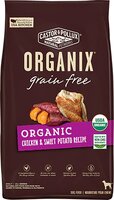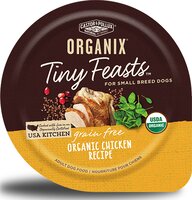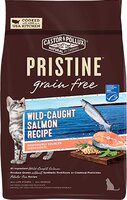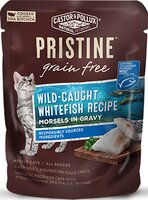
Whole Paws vs. Castor & Pollux
In this comparison article for Whole Paws vs Castor & Pollux, we'll highlight the key differences between these two pet food brands. To properly compare Whole Paws and Castor & Pollux, we'll use up-to-date nutritional and price information.
There are many factors to consider when choosing the best pet food brand for your pet. Factors such as ingredient quality, guaranteed analysis, product safety, brand history, and cost are among the most important factors to consider.
Throughout this Castor & Pollux vs Whole Paws comparison, we've utilized average data to make general comparisons. If you'd like to see individual product reviews, visit our Whole Paws Review Page or Castor & Pollux Review Page.
Guaranteed Analysis: Castor & Pollux vs. Whole Paws
According to AAFCO, all pet food labels must provide a guaranteed analysis of nutrient content. The analysis must provide guaranteed minimum percentages of crude protein and crude fat, and maximum percentages of crude fiber and moisture.
All percentages used in this comparison are averages reported on a dry matter basis.
Whole Paws Dog Food vs. Castor & Pollux Dog Food
| Dry Dog Food | Whole Paws | Castor & Pollux |
| Crude Protein | 29.8% | 32.6% |
| Crude Fat | 17.3% | 17.1% |
| Crude Fiber | 3.3% | 4.2% |
| Wet/Canned Dog Food | Whole Paws | Castor & Pollux |
| Crude Protein | 40.5% | 39.9% |
| Crude Fat | 23.6% | 23.5% |
| Crude Fiber | 7.5% | 6.5% |
Crude Protein Comparison For Dog Food
Dogs require twenty-two amino acids to sustain life. Twelve of these amino acids are synthesized naturally, the remaining ten are consumed. Protein is the nutrient which provides some or all of these ten essential amino acids.
There is a small difference between the protein content of Castor & Pollux and Whole Paws. We can see that Castor & Pollux guarantees about 2.81% more protein than Whole Paws. For wet dog foods, Whole Paws and Castor & Pollux provide roughly the same amount of protein.
Crude Fat Comparison For Dog Food
Fats are an absolutely vital component of a balanced canine diet. Not only do fats provide energy, but they also serve important roles in the normal development and function of your dog's body. For example, fats help dogs produce prostaglandins, which reduce inflammation among many other significant functions.
There is a relatively insignificant difference between the crude fat content of the two brands. With regards to wet dog food, Whole Paws and Castor & Pollux also provide roughly the same amount of crude fat.
Both brands provide roughly the same amount of crude fiber. With regards to wet dog food, Whole Paws and Castor & Pollux also provide roughly the same amount of crude fiber.
Whole Paws Cat Food vs. Castor & Pollux Cat Food
| Dry Cat Food | Whole Paws | Castor & Pollux |
| Crude Protein | 33.3% | 38.2% |
| Crude Fat | 18.5% | 15.7% |
| Crude Fiber | 7.0% | 4.0% |
| Wet/Canned Cat Food | Whole Paws | Castor & Pollux |
| Crude Protein | 46.1% | 43.3% |
| Crude Fat | 23.3% | 20.4% |
| Crude Fiber | 5.5% | 5.7% |
Crude Protein Comparison For Cat Food
Cats require twenty-two amino acids to sustain life. Eleven of these amino acids are synthesized naturally, the remaining eleven are consumed. Protein is the nutrient which provides some or all of these eleven essential amino acids.
There is a relatively large difference between the protein content of Castor & Pollux and Whole Paws. On average, Whole Paws dry cat food recipes contain 4.87% less protein than Castor & Pollux recipes. For wet cat foods, Whole Paws typically provides a little more protein (about 2.83% more).
Crude Fat Comparison For Cat Food
There are many ways in which dietary fat contributes to the overall health of our feline friends. Here is a short list of benefits provided by fats (not exhaustive):
- Fats help with the digestion and absorption of fat-soluble vitamins
- Reduce inflammation associated with arthritis
- Slow the growth of yeast infections
- Prevent or reduce the likelihood of certain heart problems.
- Aid in the development of the retina and visual cortex.
According to our average data, Castor & Pollux typically provides less fat than Whole Paws. However, this difference is relatively small and doesn't represent a significant difference between the two brands. In addition, Whole Paws wet cat foods also provide more fat than Castor & Pollux wet foods.
If you look at the average percentages of crude fiber, you'll notice that Whole Paws typically guarantees 3.01% more fiber. This is a fairly small difference between Whole Paws and Castor & Pollux, but still worth mentioning. For wet cat foods, Castor & Pollux and Whole Paws provide roughly the same amount of fiber.
Whole Paws Pet Food Ingredients vs. Castor & Pollux Pet Food Ingredients
Whole Paws and Castor & Pollux both use the following controversial ingredients in many of their products:
Here are some of the controversial ingredients used only by Whole Paws.
Here are some of the controversial ingredients used only by Castor & Pollux.
We believe that certain pet food ingredients are linked to adverse health affects; these ingredients are classified as harmful.
Here are some of the harmful ingredients used only by Castor & Pollux.
Product Safety: Recall History of Whole Paws & Castor & Pollux?
According to our records, Whole Paws has never been recalled.
Castor & Pollux has been recalled once.
- May 23, 2018: elevated levels of beef thyroid hormone
Disclosure: PawDiet has an affiliate relationship with stores featured (or linked-to) in this article. We are compensated for referring customers. Thank you for shopping with our retail partners!
Where To Buy Whole Paws Pet Foods
You can purchase Whole Paws pet foods from the following stores:
Where To Buy Castor & Pollux Pet Foods
You can purchase Castor & Pollux pet food products from these retailers:



Type Of Pet Foods Available
| Product | Whole Paws | Castor & Pollux |
| Dry Dog Food | 5 Recipes | 17 Recipes |
| Wet Dog Food | 7 Recipes | 28 Recipes |
| Dog Treats | 8 Treats | 22 Treats |
| Dry Cat Food | 3 Recipes | 6 Recipes |
| Wet Cat Food | 8 Recipes | 18 Recipes |
| Cat Treats | None | 1 Treats |
Top Rated Whole Paws Recipes
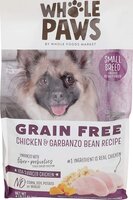
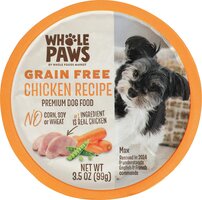
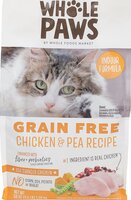
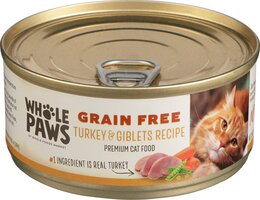
Top Rated Castor & Pollux Recipes
